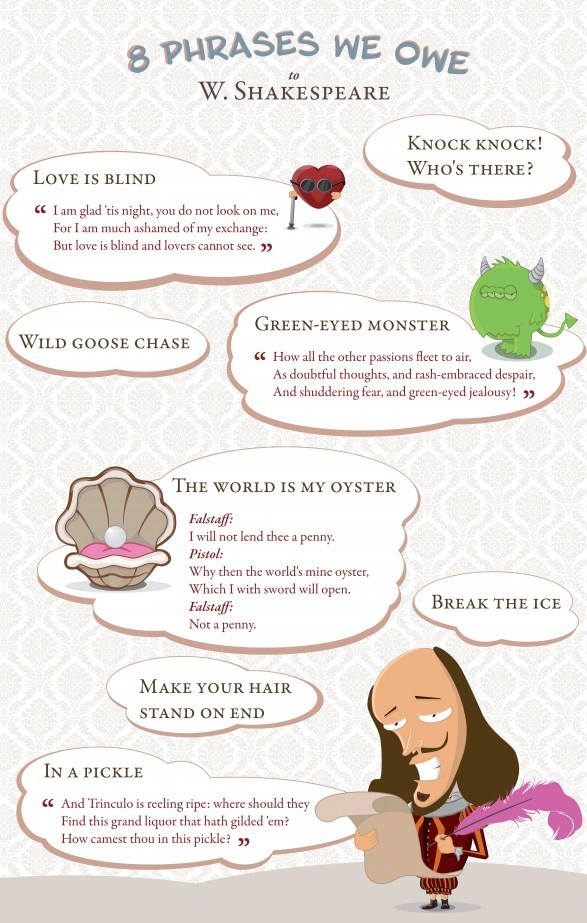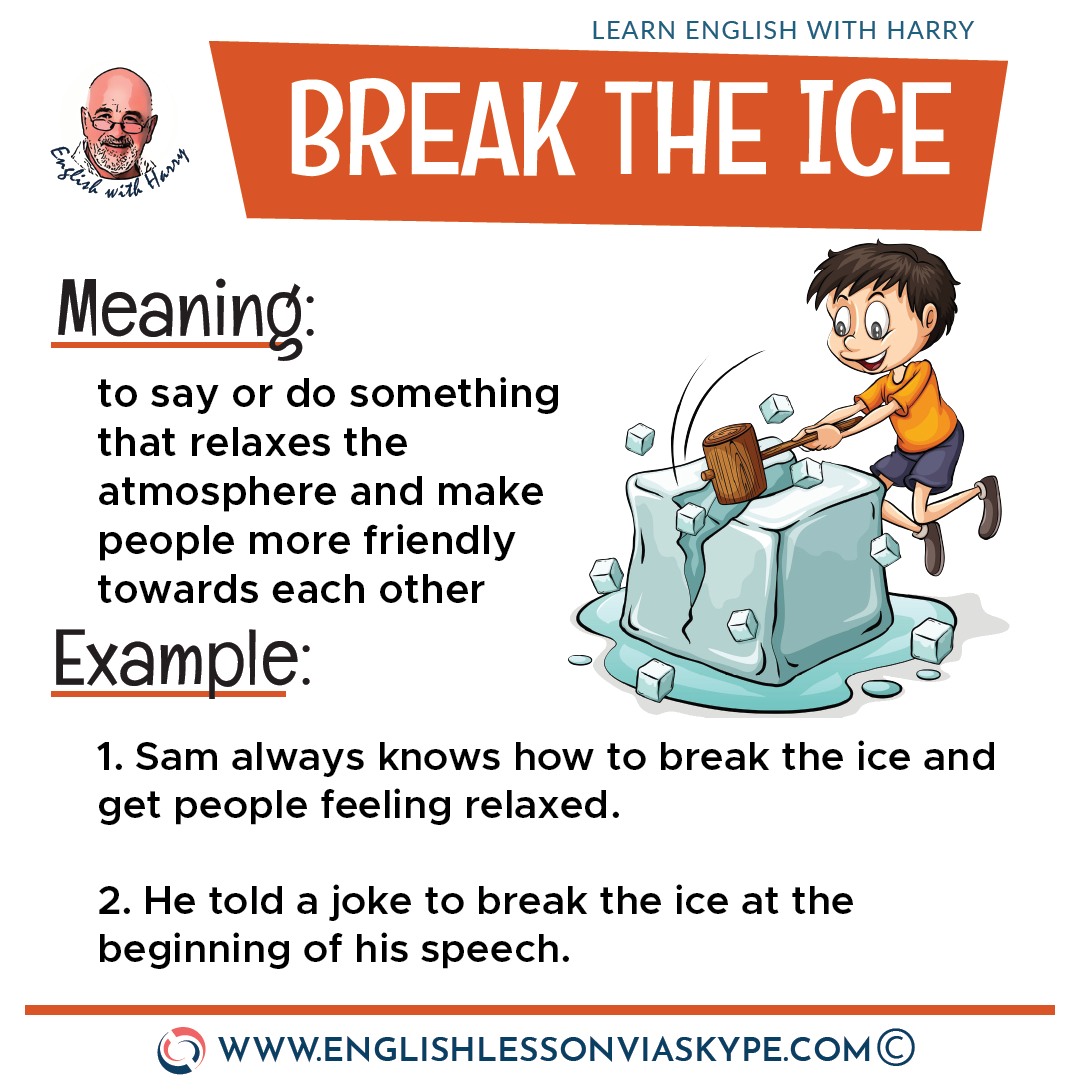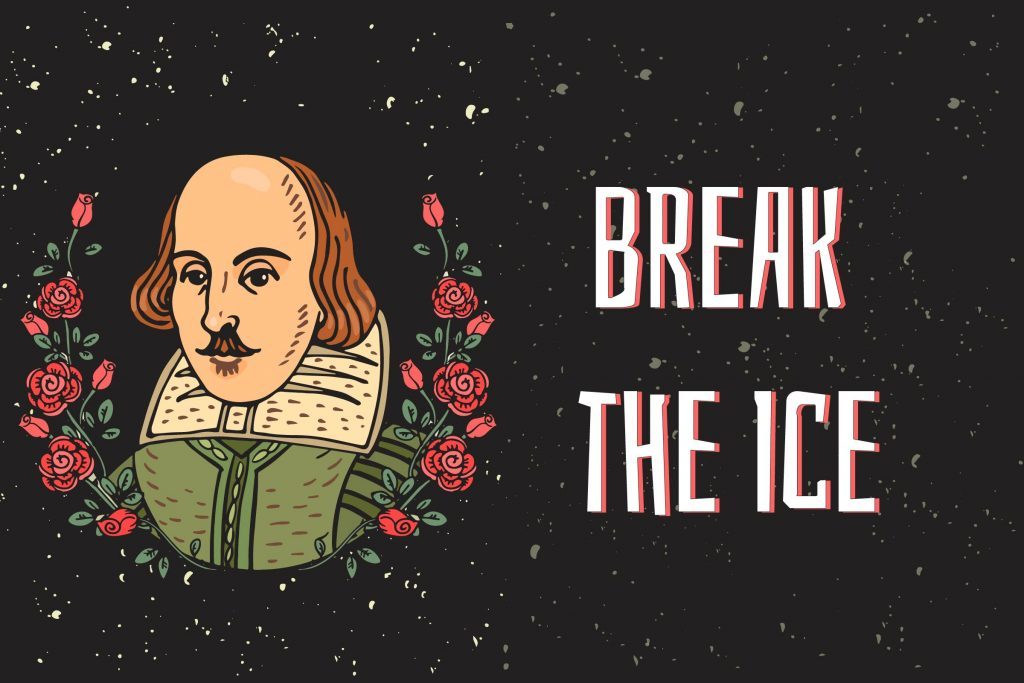
If you’re trying to “break the ice” at a party, you’re quoting Shakespeare. If you’re “in a
The original literal definition of breaking the ice referred to icebreaker ships whose function was to break the ice to clear passage for other ships. The definition as we know it now evolved into a social meaning with the earliest recorded writing in this context appearing in Shakespeare's Taming of the Shrew, written circa 1590.

10 Common Phrases We Should Thank Shakespeare For
Origin: The Merchant of Venice "Be nominated for an equal pound of your fair flesh, to be cut off and taken in what part of your body pleaseth me." All that glistens is not gold Here's another William Shakespeare idiom from the play "The Merchant of Venice." It's in reference to the shiny precious metal gold.

8 Redewendungen, die auf Shakespeare zurückgehen
Break the Ice: To overcome awkwardness or silence. Tranio hopes that Petruchio will break the ice with Katherine in Act 1 of The Taming of the Shrew.. Shakespeare penned this phrase in Act 5 of Love's Labour's Lost as a play on words, as the character who says it, Armando, tells the naked truth that he's not wearing a shirt.

Breaking The Ice Edition 2 Compilation by Various Artists Spotify
Break the ice - The Taming of the Shrew. Parties, online dating, meeting new friends, starting a new job….all of these experiences involve 'breaking the ice.' It can be very awkward when first meeting people you don't know. 'What am I going to say, what are they going to say, is anyone going to say anything'.

The Breaking Ice (2023) IMDb
Nevertheless, Shakespeare is still a genius for the inventive way he used the English language. Here are some phrases we still use today that can be found in Shakespeare's plays. 1. Break the ice - This is from a line in The Taming of the Shrew. To break the ice means to start a conversation with people you meet for the first time, to make it.

"Faint hearted" and "Break the ice" were expressions coined by Shakespeare. Find out more about
To break down social formality and stiffness. What's the origin of the phrase 'Break the ice'? The earlier meaning of this phrase, that is, 'to forge a path for others to follow', alludes of course to the breaking of ice to allow the navigation of boats.

'Break The Ice' Shakespeare Quote Meaning & Context
Here is a list of just a few phrases that appear in Shakespeare's plays and that are commonly spoken today: "A wild goose chase" - Romeo and Juliet. "I have been in such a pickle" - The Tempest. "I must be cruel, only to be kind" - Hamlet. "Laugh oneself into stitches" - Twelfth Night. "For goodness' sake" - Henry VIII.

20 English Collocations with BREAK • Learn English with Harry 👴
When we use the phrase today it's in the context of human behaviour - the fair and honest treatment of people, or in sport - playing in accordance with the rules, not cheating or having an unfair advantage. 'Fair' comes from the Old Norse: fagr - 'beautiful', and also from the Old Gothic: fagrs - 'fitting.' 'g' is spoken as 'y' in both languages.

Pin on English Word Origins
'Break the ice' as a metaphor made its first appearance in Shakespeare's The Taming of the Shrew (Act 1, Scene 2). Shakespeare used it as a term for a social gesture when Tranio, in talking about the problem of wooing the ice cold Katherine, says: If it be so, sir, that you are the man Must stead us all, and me amongst the rest,
Idioms to Break the Ice English Piece by Piece
In 1590, the term 'Break the ice' was written into the William Shakespeare play The Taming Of The Shrew. The scripted line was; "And if you break the ice and do this feat". It was spoken by the character Tranio who was impersonating Lucentio. The intended reference was towards the wooing of Katherine who was said to have a cold demeanour to.

Quotes by Shakespeare 'Break the ice' YouTube
"Break the Ice" Shakespeare wrote this group of words in his 1590 play "The Taming of the Shrew." It means to overcome a socially awkward situation. "Wild Goose Chase" First seen in 1597's "Romeo and Juliet," a person who goes on a "wild goose chase" is searching for something that's likely not attainable. "Love Is Blind"

The Magic of Shakespeare Some Finished "Shakespeare Said..." graphics
" - The Taming of the Shrew (Act 1, Scene 2) by William Shakespeare Shakespeare used it as a social gesture when Tranio talked about the problem of wooing the ice-cold Katherine. Shakespeare suggests approaching her by getting to know her father first, which will break the ice.

Expressions You Didn't Know Came from Shakespeare Reader's Digest
Break the ice To reduce the awkward, initial social tension Taming of the Shrew, Act 1 Scene 2. Brave new world Used ironically to refer to a new, hopeful period The Tempest, Act 5 Scene 1. Melted into thin air To disappear suddenly, leaving no traces The Tempest, Act 4 Scene 1

Everyday phrases Shakespeare made up Business Insider
Figuratively speaking, "ice" is that awkwardness or tension that comes from not knowing people. When a bunch of people get together for the first time, they don't know what they have in common. Sometimes people don't feel comfortable enough to talk to one another. Breaking the ice and "ice-breakers" are supposed to put everyone at ease.

Breaking the ice
the lady doth protest too much. the milk of human kindness. to thine own self be true. too much of a good thing. towering passion. wear one's heart on one's sleeve. witching time of the night. Read words that Shakespeare invented >>. When we talk about 'Shakespeare phrases' we mean the many sayings, idioms and phrases that Shakespeare.

Breaking the Ice (2022) IMDb
The naked truth. When someone tells you "the naked truth," you know they're being completely honest—and that's a pretty good sign that you can trust them. But Shakespeare gets punny with.